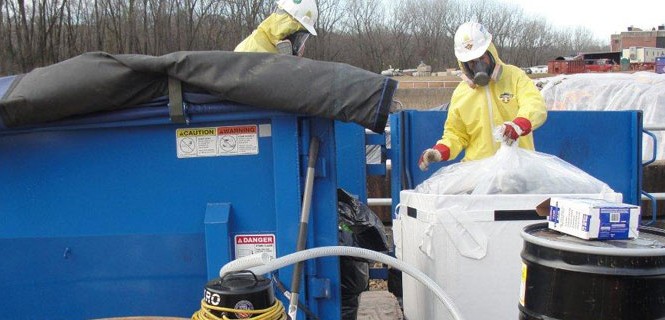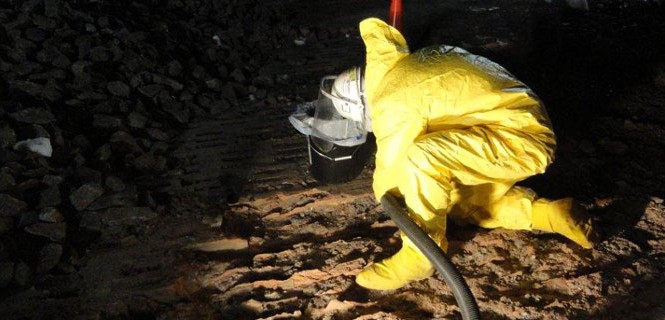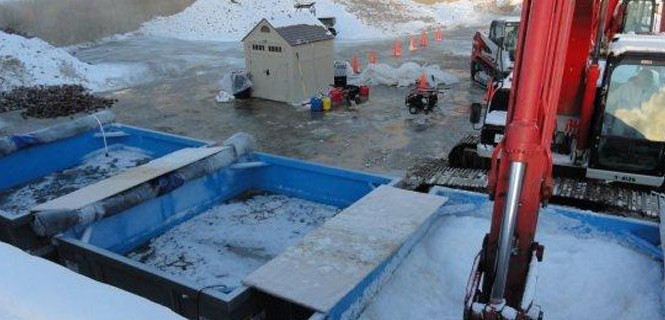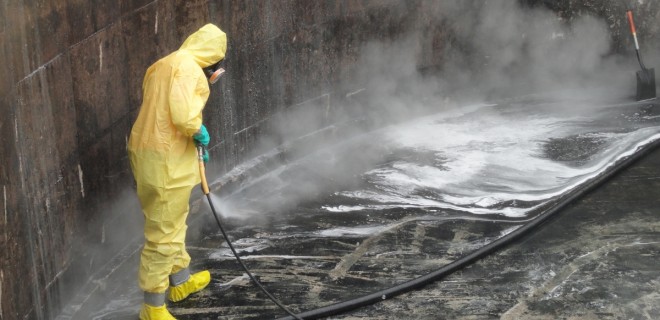LET NORTH SHORE PREVENT THE COST OF AN EXPENSIVE MERCURY SPILL CLEANUP.
Mercury problems require quick action and expert resources. When you’re dealing with a mercury spill or facility decontamination issue, call North Shore. Our experienced team will handle every aspect of your problem from assessment to containment, removal and disposal, with the highest regard for safety and regulatory compliance.
Count on North Shore for a full range of mercury spill services including:
- Incident response and interface with all regulatory agencies to establish spill cleanup protocols
- Level D, C, B, and A response capabilities
- Field sampling
- Mercury spill cleanup
- Mercury facility decontamination
- Mercury air monitoring
- Mercury device or component (universal waste) collection and disposal
- Mercury contaminated waste disposal (and transportation)
- Regulatory closure report preparation and submittal
- Mercury center pivot bearing decommissioning associated with trickling filters
What sets North Shore apart?
- Listed as a resource by the Wisconsin Department of Health: http://dhs.wisconsin.gov/eh/HlthHaz/fs/hgresources.htm
- Experience with hundreds of mercury spill clean-ups
- Extensive array of mercury monitoring and clean-up equipment and tools, plus state-of-the-art personal protective equipment
- Project manager oversight on every job
- Compliance and regulatory expertise and long-term relationships with local, state and federal agencies
North Shore is the mercury spill resource of choice for leading organizations and governmental entities including:
- Environmental Protection Agency
- Army Corp of Engineers
- Department of Natural Resources
- Waste Water Treatment Facilities
- Healthcare
- Municipalities
- Utilities
- Petroleum Industry
- Industrial
- Commercial
Click here for Mercury MSDS Informational Sheet
BACKGROUND
Wastewater treatment facilities use trickling filters mainly for reducing the levels of biological oxygen demand and total suspended solids in wastewater. Settling tanks use pivot arms to separate solids from the solid-liquid suspension. The center columns of the trickling filters and pivot arms bearings are likely to contain a large amount of mercury. Mercury was used as a water seal because of its high density and low friction and also helped balance the pressure while wastewater pumped through the filter. After many incidents resulting in contamination due to mercury seals leaking hundreds of pounds of mercury into the tanks, the use of mercury was prohibited and companies stopped the manufacturing of mercury seals approximately 30 years ago.
NSEC provides expert assessment decommissioning, and disposal of the Center Pivot Bearing associated with trickling filters at Waste Water treatment facilities. Improper handling and assessment of the mercury seals in the bearings can result in catastrophic disasters as what happened at the Dubuque Waste Water Plant in Dubuque, Iowa at the start of the 65 million dollar plant renovation in September of 2010. The improper handling of the bearings during removal by a local contractor was catastrophic. OSHA levied fines against several contractors and against the City of Dubuque. The spill clean up took approximately 6 months to complete. THIS COULD HAVE BEEN AVOIDED.
DANGER: Mercury is extremely dangerous. Contact North Shore’s spill management team at 262-255-4468 for 24/7 emergency service in the event of a spill. Elemental (metallic) mercury is a heavy, silvery metal element that is a liquid at room temperature. Liquid mercury evaporates at room temperature and its vapors are invisible, odorless and, at high levels, very toxic. Metallic mercury is often found in thermometers, barometers, manometers, electrical switches and thermostats. In some cases even small spills can cause high levels of mercury vapors that are unsafe to breathe.










